牛津译林版八年级上 8A Unit7 知识点梳理学案
牛津译林版八年级上 8A Unit7 知识点总结学习资料

牛津译林版八年级上 8A Unit7 知识点总结学习资料Unit Overview本单元主要介绍了动词的时态用法,包括一般现在时、一般过去时和一般将来时。
同时,还包括了一些与时间和日常活动相关的词汇和表达方式。
Grammar Points1. 一般现在时一般现在时用于描述经常性或普遍的情况、惯、事实和真理等。
例如:- I usually go to school by bus.- The sun rises in the east.- She likes playing basketball.2. 一般过去时一般过去时用于描述发生在过去的动作、状态或惯。
通常与过去的时间状语连用。
例如:- Last night, I watched a movie with my friends.- They lived in Beijing for five years.- He played the piano when he was a child.3. 一般将来时一般将来时用于表达将来发生的动作、事件或决定。
常和一些表示将来的时间状语连用。
例如:- I will go to the supermarket tomorrow.- They are going to visit their grandparents next month.- We plan to go on a vacation next week.Vocabulary下面是与时间和日常活动相关的一些词汇和表达方式:- morning: 早晨- afternoon: 下午- evening: 晚上- night: 夜晚- wake up: 醒来- brush teeth: 刷牙- have breakfast/lunch/dinner: 吃早餐/午餐/晚餐- go to school/work: 去学校/上班- do homework: 做作业- play sports/games: 进行体育运动/玩游戏- watch TV: 看电视- go to bed: 上床睡觉以上是本单元的主要知识点总结。
牛津英语译林版8AUnit7知识梳理
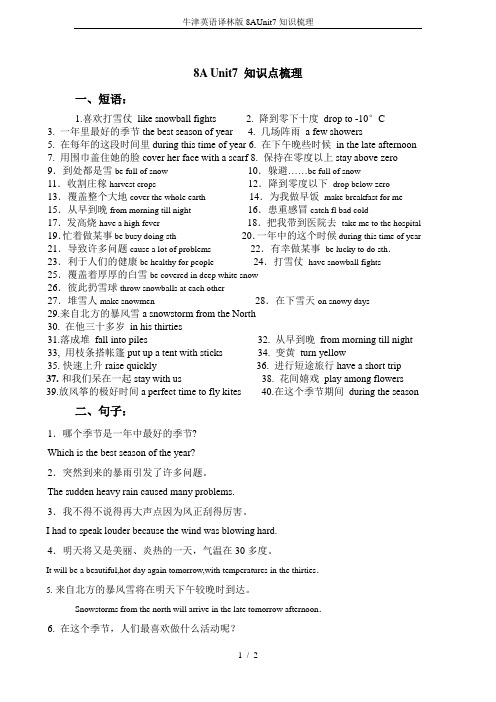
8A Unit7 知识点梳理一、短语:1.喜欢打雪仗like snowball fights2. 降到零下十度drop to -10°C3. 一年里最好的季节the best season of year4. 几场阵雨a few showers5. 在每年的这段时间里during this time of year6. 在下午晚些时候in the late afternoon7. 用围巾盖住她的脸cover her face with a scarf8. 保持在零度以上stay above zero 9.到处都是雪be full of snow10.躲避……be full of snow11.收割庄稼harvest crops 12.降到零度以下drop below zero 13.覆盖整个大地cover the whole earth 14.为我做早饭make breakfast for me 15.从早到晚from morning till night 16.患重感冒catch fl bad cold17.发高烧have a high fever 18.把我带到医院去take me to the hospital 19.忙着做某事be busy doing sth 20.一年中的这个时候during this time of year 21.导致许多问题cause a lot of problems 22.有幸做某事be lucky to do sth.23.利于人们的健康be healthy for people 24.打雪仗have snowball fights25.覆盖着厚厚的白雪be covered in deep white snow26.彼此扔雪球throw snowballs at each other27.堆雪人make snowmen 28.在下雪天on snowy days29.来自北方的暴风雪a snowstorm from the North30. 在他三十多岁in his thirties31.落成堆fall into piles 32. 从早到晚from morning till night 33, 用枝条搭帐篷put up a tent with sticks 34. 变黄turn yellow35.快速上升raise quickly 36. 进行短途旅行have a short trip 37.和我们呆在一起stay with us 38. 花间嬉戏play among flowers39.放风筝的极好时间a perfect time to fly kites 40.在这个季节期间during the season二、句子:1.哪个季节是一年中最好的季节?Which is the best season of the year?2.突然到来的暴雨引发了许多问题。
译林版牛津英语8AUnit7单词知识点讲解.doc
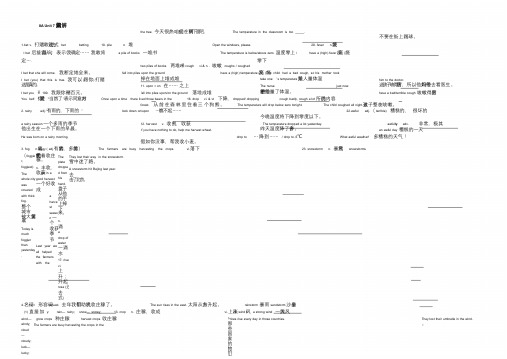
8A Unit 7单词知识点讲解the tree. 今天很热,咱们坐在树荫下面吧。
The temperature in the classroom is too _____.不要在街上踢球。
1.bet v. 打赌;敢说过去式 bet betting10. pilen. 堆Open the windows, please.20. fever n.发烧 I bet 后接宾语从句, 表示 “我确定 ⋯ ⋯ 我敢肯a pile of books 一堆书;The temperature is below/above zero. 温度零上 /have a (high) fever 发(高)烧定⋯ .零下two piles of books 两堆书21. cough vi.& n . 咳嗽 coughs / coughedI bet that she will come. 我断定她会来。
fall into piles upon the ground have a (high) temperature 发(高)烧T he child had a bad cough, so his mother tookI bet (you) that this is true. 我可以 (跟你)打赌 这是真的。
I bet you ¥100. 我跟你赌一百元。
掉在地面上堆成堆 11. upon = on 在⋯ ⋯ 之上 fall into piles upon/on the ground 落地成堆t ake one ’s temperature 给某人量体温The nurse just now.护士刚才给他量了体温。
h im to the doctor. 这孩子咳得厉害,所以他妈妈带他去看医生。
have a bad/terrible cough 咳嗽得厉害 You bet! “你说对了 ”“当然了 ”表示同意对方 Once upon a time there lived three bears in the 16. drop vi. & vt 下降, dropped/ dropping cough badly, cough a lot 所说的内容forest. 从 前 在 森 林 里 住 着 三 个 狗 熊 。
牛津译林版八年级上 8A Unit7 重要知识点归纳

牛津译林版八年级上 8A Unit7 重要知识点归纳本文档旨在归纳牛津译林版八年级上册第7单元(Unit7)的重要知识点,帮助同学们更好地研究和掌握该单元的内容。
1. 单词和短语- silk(丝绸): a soft, delicate and shiny fabric made from the threads produced by silkworms.- cotton(棉花): a soft, fluffy fiber that grows in a boll, or protective case, around the seeds of cotton plants.- linen(亚麻布): a fabric made from flax fibers that is known for its coolness and freshness.- wool(羊毛): the soft, thick hair that grows on the bodies of sheep and some other animals.- leather(皮革): a material made from the skin of an animal.- bamboo(竹子): a type of tall, woody grass that grows in tropical and subtropical regions.- originate(起源): to have a specific beginning or source.- export(出口): to send goods or services to another country for sale.- process(加工): to perform a series of actions or operations on something to change or transform it.- traditional(传统的): relating to the customs, beliefs and practices that have been passed down through generations.- production(生产): the process of making or manufacturing goods.- contribute(贡献): to give or provide something, such as money, help or ideas.- benefit(受益于): to gain advantage or profit from something.2. 重点句子- Silk originally came from China and was exported to other countries along the Silk Road.- Linen is a type of fabric that is made from flax fibers.- Wool is often used to make warm clothing because it is a good insulator.- Bamboo is a versatile material that can be used for making furniture, paper, and other products.- Traditional crafts play an important role in preserving cultural heritage.3. 文化背景本单元主要介绍了不同种类的纺织材料和其在各个国家的应用,以及传统工艺对文化遗产的保护。
牛津译林版八年级上 8A Unit7 学习要点总结

牛津译林版八年级上 8A Unit7 学习要点总结本文档总结了牛津译林版八年级上册第七单元的研究要点。
1. 词汇本单元的重点词汇包括:- volcano(火山)- ___(喷发)- disaster(灾难)- earthquake(地震)- tsunami(海啸)- ash(灰烬)- evacuate(疏散)- rescue(救援)- emergency(紧急情况)- relief(救济)2. 重点句型本单元的重点句型包括:- Have you ever experienced a natural disaster?(你曾经经历过自然灾害吗?)- What should we do in case of an earthquake?(发生地震时我们应该怎么办?)- It is ___.(在灾难中保持冷静是很重要的。
)- We must take ___.(我们必须立即采取行动确保每个人的安全。
)3. 语法要点本单元的语法要点包括:- 过去完成时:had + 过去分词,表示在过去某个时间点之前已经发生的动作或完成的状态。
- 被动语态:情态动词 + be + 过去分词,表示动作的承受者。
4. 阅读理解本单元的阅读理解部分包含了几篇关于自然灾害的文章,可以通过阅读来了解相关知识和培养阅读理解能力。
5. 写作训练本单元的写作训练主要是要求学生写一篇关于自然灾害的短文,可以包括自己的经历、了解和建议等。
6. 拓展研究学生可以通过额外的阅读、观看相关视频、访问相关网站等拓展研究,增加对自然灾害的了解。
以上是牛津译林版八年级上册第七单元的学习要点总结,希望对同学们的学习有所帮助。
牛津译林版八年级上 8A Unit7 知识点回顾学习材料
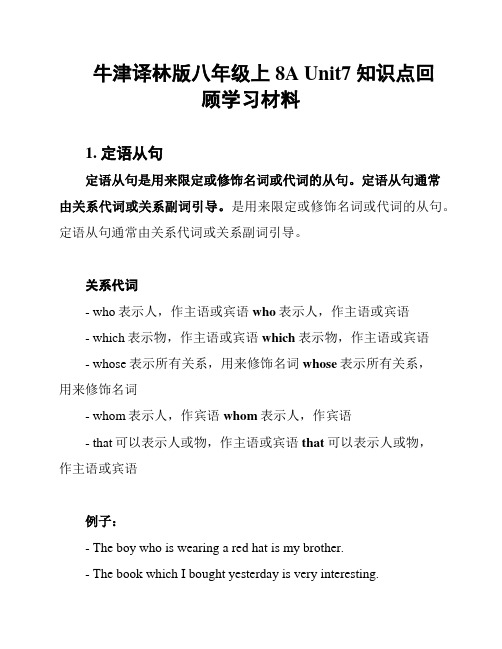
牛津译林版八年级上 8A Unit7 知识点回顾学习材料1. 定语从句定语从句是用来限定或修饰名词或代词的从句。
定语从句通常由关系代词或关系副词引导。
是用来限定或修饰名词或代词的从句。
定语从句通常由关系代词或关系副词引导。
关系代词- who表示人,作主语或宾语who表示人,作主语或宾语- which表示物,作主语或宾语which表示物,作主语或宾语- whose表示所有关系,用来修饰名词whose表示所有关系,用来修饰名词- whom表示人,作宾语whom表示人,作宾语- that可以表示人或物,作主语或宾语that可以表示人或物,作主语或宾语例子:- The boy who is wearing a red hat is my brother.- The book which I bought yesterday is very interesting.- The girl whose father is a doctor is my classmate.- The teacher whom we met at the library is very nice.- The car that is parked outside belongs to my neighbor.关系副词- where表示地点where表示地点- when表示时间when表示时间- why表示原因why表示原因例子:- This is the school where I studied last year.- I remember the day when we first met.- I don't understand the reason why he is angry.2. 情态动词情态动词是用来表示说话人的情感、态度或推测的动词。
常见的情态动词包括can, could, may, might, must, shall, should, will, would, ought to等。
2024年牛津译林版八年级英语上册8A Unit 7 单元教案

2024年牛津译林版八年级英语上册8A Unit7 单元教案一、教学内容本节课选自2024年牛津译林版八年级英语上册8A Unit 7,主要内容包括:Grammar(现在完成时态);Reading(旅行经历分享);Vocabulary(与旅行相关的词汇)。
二、教学目标1. 学生能够理解和掌握现在完成时态的构成和用法。
2. 学生能够通过阅读文章,了解旅行经历,并能用英语进行分享。
3. 学生能够熟练运用与旅行相关的词汇,进行日常交流。
三、教学难点与重点1. 教学难点:现在完成时态的构成和用法。
2. 教学重点:阅读理解能力的培养,词汇的运用。
四、教具与学具准备1. 教具:PPT、黑板、教学卡片。
2. 学具:课本、练习册、文具。
五、教学过程1. 引入:通过展示一组旅行图片,引发学生对旅行话题的兴趣。
2. 阅读理解:学生阅读课文,回答相关问题,了解旅行经历。
3. 例题讲解:讲解现在完成时态的构成和用法,结合例句进行演示。
4. 课堂练习:学生进行现在完成时态的句子练习,教师给予指导。
5. 词汇学习:学习与旅行相关的词汇,并进行小组讨论,运用词汇进行交流。
6. 小组活动:学生分组,运用所学词汇和现在完成时态,编写一段旅行经历对话。
7. 展示与评价:各小组展示成果,其他学生给予评价。
六、板书设计1. Unit 7 Travel2. 主要内容:Grammar: Present Perfect TenseReading: Travel experiencesVocabulary: Travelrelated words七、作业设计1. 作业题目:a. 根据所给图片,用现在完成时态描述旅行经历。
b. 编写一段旅行经历对话,运用所学词汇。
2. 答案:八、课后反思及拓展延伸1. 反思:关注学生在课堂上的参与度,及时给予指导和鼓励,提高学生的积极性。
2. 拓展延伸:鼓励学生课后进行实地调查,了解身边人的旅行经历,并用英语进行分享。
2024年牛津译林版八年级英语上册8AUnit7单元教案

2024年牛津译林版八年级英语上册8A Unit7 单元教案一、教学内容本节课选自2024年牛津译林版八年级英语上册8A Unit 7,主要内容包括:Reading部分“Seasons of the year”和“Which season do you like best?”,以及Grammar部分“Present perfect tense”。
二、教学目标1. 了解和掌握四个季节的名称及特点。
2. 学会使用现在完成时描述过去发生的事情对现在的影响。
3. 能够运用所学知识进行情景对话,表达自己对不同季节的喜好。
三、教学难点与重点1. 教学难点:现在完成时的构成及用法。
2. 教学重点:四个季节的词汇和现在完成时的运用。
四、教具与学具准备1. 教具:多媒体课件、黑板、粉笔。
2. 学具:英语课本、练习本、彩笔。
五、教学过程1. 引入:通过展示四个季节的图片,引导学生说出季节的名称及特点。
2. Reading部分:让学生自主阅读“Seasons of the year”和“Which season do you like best?”,然后回答相关问题。
3. Grammar部分:讲解现在完成时的构成及用法,举例说明,让学生进行随堂练习。
4. 情景对话:分组进行角色扮演,运用所学知识进行对话。
六、板书设计1. Seasons of the year: spring, summer, autumn, winter2. Present perfect tense: have/has + past participlee.g. I have finished my homework.七、作业设计1. 作业题目:(1) Write a short passage about your favorite season.(2) Translate the following sentences into English using the present perfect tense:a. 我已经吃过了晚饭。
牛津译林版 八年级上册8AUnit7学习要点梳理
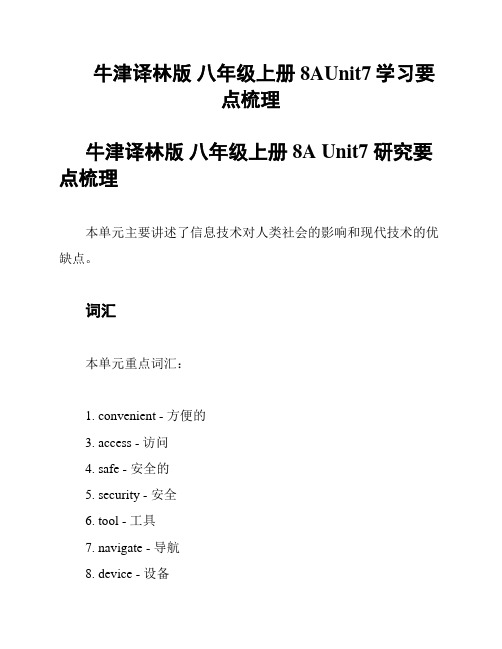
牛津译林版八年级上册8AUnit7学习要点梳理牛津译林版八年级上册8A Unit7 研究要点梳理本单元主要讲述了信息技术对人类社会的影响和现代技术的优缺点。
词汇本单元重点词汇:1. convenient - 方便的3. access - 访问4. safe - 安全的5. security - 安全6. tool - 工具7. navigate - 导航8. device - 设备10. install - 安装重点短语1. in a way - 在某种程度上2. make use of - 利用3. be connected to - 与...相连4. at risk - 有风险5. rely on - 依赖于6. on the other hand - 另一方面7. be aware of - 意识到8. keep...secure - 使...安全语法本单元重点语法:现在分词作状语现在分词可以表达时间、方式、原因、条件、伴随状况等。
例如:- Using the Internet, we can learn anything we want.写作本单元的写作要求是写一篇关于现代科技的议论文。
让学生们了解科技的优点和缺点,以及我们应如何正确地利用科技。
口语本单元的口语任务是与同伴共同制定一个安全使用互联网的计划,并向全班展示。
在本单元中,我们学习了许多关于信息技术的词汇和短语,我们也了解了现代科技的好处和弊端,同时还学会了如何正确地利用它们。
通过学习,我们应该能够更明智地使用科技。
牛津译林8A Unit7 知识点
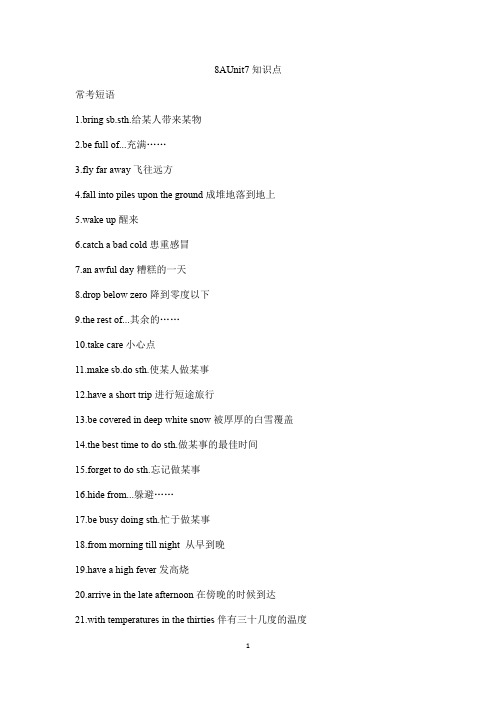
8AUnit7知识点常考短语1.bring sb.sth.给某人带来某物2.be full of...充满……3.fly far away飞往远方4.fall into piles upon the ground成堆地落到地上5.wake up醒来6.catch a bad cold患重感冒7.an awful day糟糕的一天8.drop below zero降到零度以下9.the rest of...其余的……10.take care小心点11.make sb.do sth.使某人做某事12.have a short trip进行短途旅行13.be covered in deep white snow被厚厚的白雪覆盖14.the best time to do sth.做某事的最佳时间15.forget to do sth.忘记做某事16.hide from...躲避……17.be busy doing sth.忙于做某事18.from morning till night 从早到晚19.have a high fever发高烧20.arrive in the late afternoon在傍晚的时候到达21.with temperatures in the thirties伴有三十几度的温度22.a bit有一点23.cover..…with...用…….盖住……24.make sb.+adj.使某人(觉得)……25.at the weekend在周末26.have big snowball fights 打一场大雪仗重要句型1.Which..do you like best?你最喜欢哪个…………?例:Which season do you like best?你最喜欢哪个季节?2.How...doing?……怎么样?例:How are you doing?你怎么样?3.What a perfect time to do sth!正是做某事的绝佳时机啊!例;What a perfect time to fly a kite!正是放风举的好时节!4.…throw snowballs at each other...……相互扔雪球……例:We throw snowballs at each other,screaming and laughing.我们向对方扔雪球,叫着,笑着。
牛津译林版 八年级上册8AUnit7知识点讲解

牛津译林版八年级上册8AUnit7知识点讲解8AU7知识点讲解探究bring和XXX的区别:XXX表示从远处拿到说话的地点来,常与here,me搭配;例如:XXX明天请把我的帽子带给我。
XXX表示从说话地点拿到远处去,常与there,away搭配;例如:Take your raincoat with you。
It's going to rain.把你的雨衣带着。
天要下雨。
用take或XXX填空:Will you XXX。
I need to use it.探究feel cool中的feel:XXX在此用作连系动词,意为“感到,觉得”。
例如:I XXX,XXX.我感到冷。
请把我的外套递给我。
XXX of feel:XXX(棉花) feels soft.探究with的意思:With意为“具有,带着”,表示伴随着某种状态,其反义词为without。
例如:Fish sleep with eyes open.鱼睁着眼睛睡觉。
XXX:Recite the text with your book closed.探究以because开头的答句:以because开头的答句回答以why开头的问句。
例如:Why are you late。
Because the traffic was bad.你为什么迟到了?因为交通状况不好。
Why do you enjoy playing games?Because they are interesting.Rewritten: What is the reason for your enjoyment of playing games?XXX.I like autumn because it is always cool。
What about you。
Rewritten: What is your reason for liking XXX?The words "sun" and "sunny" are related in that "sunny" is the adjective form of "sun"。
牛津译林版8A Unit7 Seasons全部导学案

____________8年级上册Unit7表天气的名词+ y (+ y)→形容词8 上Unit 7 单元测验一、单项选择:(15%)( )1. It’s ________. The ground is all white.A. rainyB. sunnyC. windyD. snowy( )2. “bright” does not rhymes with _________.A. kite B quiet C right D quite( )3. “We have four seasons.” Which sentence structure does the sentence belong to?A S+V+PB S+VC S+V+OD S+V+IO+DO( )4. Summer is usually very hot. Sometimes the temperatures are__________.A within thirtiesB in the thirtiethC in the thirtiesD in the thirty( )5. Mum bought us some books. Two are for me, the rest of them ________ for my brother.A isB areC amD was( )6. Leaves start to turn brown, the temperature drops. Farmers work hard to harvest crops. What season is it?A springB summerC autumnD winter( )7. Helen had a cold, then had a fever, she coughed a lot. It was __________ day for her.A a awfulB an terribleC an awfulD an exciting( )8. The bottle is __________ juice.A full withB full ofC fill withD fill with( )9. I know him better ________ time flies.A asB whileC whenD for( )10. I have nothing ________ in my pocket.A to leaveB leftC leavingD leaves( )11. Will you please ________ your dictionary to school this afternoon if you come to school?A takeB to bringC to takeD bring( )12. They will go to the park ________ Sunday afternoon.A inB atC onD of( )13. I was ________ when I heard what the teacher said.A surprisingB excitedC excitingD boring( )14. They enjoy _________ the piano.A playB to playingC to playD playing( )15. The food on the table tastes _______.A deliciousB willC badlyD nicely二、完形填空:(15%)Suppose(假如) you are going to Boston, and you ___1____ the city before. If someone____2___ you about the interesting places in the city, you ___3__ to get some ideas of what you will see. But don’t have a ___4__ idea of where these places are or of how to find ___5____. However, ___6____ someone has a map of the city and ___7___ you the main roads and buildings, you maysay, “Oh, now I see. I can find my way with ___8___ trouble at all.” Working in maths is somewhat(有点儿) like trying to find your way ___9____ a new city. Perhaps the words may tell you some information and you have ___10___ it, but you can’t see any clear road ___11___ the answers.Maybe you ___12___ a kind of map of the main roads in maths ____13___ you find your way. Explore(探究) what likes in maths, and___14___ to find the main roads. They will __15___ you to the answer. If you can find the “map”, the maths problems will be easily worked out.( )1. A are going to visit B once visited C have never visited D have ever visit( )2. A answers B shows C meets D tells( )3. A begin B like C learn D refuse( )4. A clever B clear C strange D wrong( )5. A someone B Boston C them D it( )6. A if B though C whether D since( )7. A helps B gives C passes D shows( )8. A not B no C some D much( )9. A of B to C in D around( )10. A thought over B heard about C written down D talked with( )11. A with B for C of D to( )12. A need to have B don’t need C needn’t D in need of( )13. A help B to help C helps D help with( )14. A try your best B take your place C look up D walk on( )15. A keep B send C lead D ask三.阅读理解:(20%)(A)Scientists have helped people understand the dangers facing the earth. As people live on the earth, we should be fully ready to deal with the dangers. If we do not pay more attention to the problems caused by air pollution, our earth may no longer be a healthy place for plants, animals, and people to live.Cleaning up the air is a job that all countries must work on. The problems caused by air pollution can be solved, but a lot of work needs to be done. Governments around the world are beginning to work together to lower the levels of dangerous gases in the atmosphere(大气层). If this can be done well, the ozone layer (臭氧层) can rebuild itself, global warming can be controlled, and acid rain can be reduced.In 1967, the government of the United States passed the Clean Air Act. More parts were added to the act in 1970,1977 and 1990. as a result of these laws, cars now must reduce the amounts of harmful gases. Power factories must use “clean coal” methods to reduce acid rain they produce.In 1970, the Environment Protection Agency(EPA) was set up. The EPA’s job is to make sure that environmental laws are being followed and to find out new dangers and offer solutions. The first Earth Day was also celebrated in 1970.While it is very important to address air pollution on a global scale, each person can also do something to protect the Earth. Here are some things you can do every day:1. Turn down the heat and air conditioning.2. Use the dishwasher only when they are full of dishes.3. practice the 3 Rs: recycle, reuse and reduce.4. Plant a tree.5. Walk or ride your bike.( )1. If we don’t care about _______ proble ms, our earth may no longer be a healthy place.A air pollutionB water pollutionC noise pollution( )2. Every country should _________ to solve the problems causes by air pollution.A rebuild the ozone layerB clean up the airC produce harmful gases( )3. All the things the EPA can do is to ___________.A make more lawsB find out new dangersC protect the environment( )4. The Clean Air Act was passed _________ by the American government.A in 1967B in 1970C in 1977( )5. In our daily life, we can do something to protect the earth by _________.A using more carsB riding the bikesC cutting down trees(B)Long, long ago people made fires from lightening(闪电). But they had to keep the fire burning, for they couldn’t start is again if there was no lightening. Later, they found out hitting two pieces of stone together could make a spark(火花). The spark could fire dry leaves. In the way they could make fire again if it went out. Then people also leaned to make a fire by rubbing(摩擦). They made a hole in piece of wood and put a smaller stick into the hole. They turned the stick again and again. After a few minutes they got fire.Years went by, people learned other ways to make a fire. Sometimes they uses the heat from the sun. they held a piece of glass in the right way and made a piece of paper on fire.About two centuries ago, people began to make matches. Matches brought people a quick and easy way to make fires. Today matches are still being used, but people have more new ways to make fires. One of them is to use an electric fire starter. Of course an electric fire starter is much more expensive than a box of matches. But it is very useful..( )1. From the text, we know that a spark can ________.A fire any leavesB burn anythingC burn day leavesD keep fire burning ( )2. We can also get a fire by _________.A making a hole in a big piece of woodB putting a smaller stick into the holeC turning the stick hard for a whileD doing all the above in order( )3. Matches have been used _____________.A for about two thousand yearB for about two hundred yearsC since people began to use fire for cookingD since people used the heat from the sun( )4. From the passage, we know that ________.A electric fire starters are widely usedB some forest fires happen from lighteningC today there are only two ways to make a fireD people haven’t used matches since they had electric fire starters( )5. Which of the following is the right order of the ways to make fires that people got to know?a. with a matchb. from the sunc. from lighteningd. by rubbinge. with an electric fire starterf. by hitting two pieces of stoneA b-a-d-e-fB b-c-a-e-d-fC c-f-d-b-aD c-d-a-f-b-e四.词汇。
牛津译林版八年级英语上册8AUnit7单元教案

牛津译林版八年级英语上册8A Unit 7 单元教案一、教学内容二、教学目标1. 学生能够理解并运用现在完成时描述过去发生且对现在有影响的动作或状态。
2. 学生能够通过阅读文章,了解地震的特点、危害及自救方法。
3. 学生能够在实际情景中运用所学知识进行交流,提高口语表达能力。
三、教学难点与重点1. 教学难点:现在完成时的构成和用法,特别是延续性动词与瞬间动词在现在完成时中的运用。
2. 教学重点:阅读文章中关于地震的词汇、短语和句子结构,以及现在完成时的用法。
四、教具与学具准备1. 教具:PPT、黑板、录音机、磁带。
2. 学具:教材、练习册、笔记本、字典。
五、教学过程1. 导入:通过展示一组地震图片,引发学生对地震话题的兴趣,进而导入新课。
2. 新课内容展示:a. 现在完成时:通过例句展示现在完成时的构成和用法,解释延续性动词与瞬间动词在现在完成时中的区别。
b. Reading:学生自主阅读文章,完成相应练习,教师进行讲解。
3. 实践情景引入:设置地震自救场景,让学生运用现在完成时描述地震发生时的状况。
4. 例题讲解:针对本节课的重点和难点,设计相关例题进行讲解。
5. 随堂练习:学生完成课堂练习,巩固所学知识。
6. 口语交流:学生分组讨论,用现在完成时描述过去发生的事情,提高口语表达能力。
六、板书设计1. Unit 7 Earthquakes2. 语法点:现在完成时的构成和用法,延续性动词与瞬间动词的运用。
3. 词汇:与地震相关的词汇、短语。
4. 重点句子:文章中的重点句子。
七、作业设计1. 作业题目:1. 我已经完成了作业。
2. 他去过北京三次。
1. What is the main idea of the article?2. How can we protect ourselves during an earthquake?2. 答案:见课后附件。
八、课后反思及拓展延伸1. 教师反思:本节课的教学效果,学生的掌握程度,以及教学过程中的优点和不足。
牛津译林版八年级英语上册8AUnit7单元教案

牛津译林版八年级英语上册8A Unit 7 单元教案一、教学内容本节课我们将学习牛津译林版八年级英语上册8A Unit 7的教材内容。
具体包括:Reading部分的“Seasons of the year”和“Which season do you like best?”,以及Grammar部分的“Present continuous tense”。
二、教学目标1. 学生能够理解并掌握描述四季变化的词汇和表达方式。
2. 学生能够运用现在进行时描述正在进行的动作。
3. 学生能够通过阅读文章,了解不同季节的特点和活动。
三、教学难点与重点重点:现在进行时的用法以及描述四季变化的词汇。
难点:正确运用现在进行时描述正在进行的动作。
四、教具与学具准备1. 教具:PPT,展示四季变化的图片和动画。
2. 学具:学生准备笔、纸和英语课本。
五、教学过程1. 导入:通过展示四季变化的图片,引导学生谈论不同季节的特点。
2. 阅读理解:学生阅读“Seasons of the year”和“Which season do you like best?”,回答相关问题。
3. 语法讲解:讲解现在进行时的构成和用法,结合例句进行说明。
4. 例题讲解:给出几个句子,让学生判断是否使用了正确的时态,并解释原因。
5. 随堂练习:学生进行现在进行时的句子练习,教师给予指导。
6. 小组活动:学生分组讨论,运用现在进行时描述组内成员正在进行的动作。
六、板书设计1. 四季变化词汇:spring, summer, autumn, winter, warm, hot, cool, cold, etc.2. 现在进行时:be + doing3. 例句:The children are playing in the park.(孩子们正在公园里玩耍。
)七、作业设计1. 作业题目:请用现在进行时描述下列场景。
a. Your friends are having a picnic in the park.b. Your parents are watching TV at home.c. The teacher is explaining the lesson to the students.答案:a. My friends are having a picnic in the park, enjoying the beautiful spring weather.b. My parents are watching TV at home, relaxing after a long day at work.c. The teacher is explaining the lesson to the students, making sure they understand the key points.2. 课后阅读:阅读一篇关于四季变化的文章,用现在进行时描述文章中的场景。
牛津译林版八年级上 8A Unit7 知识点整理笔记
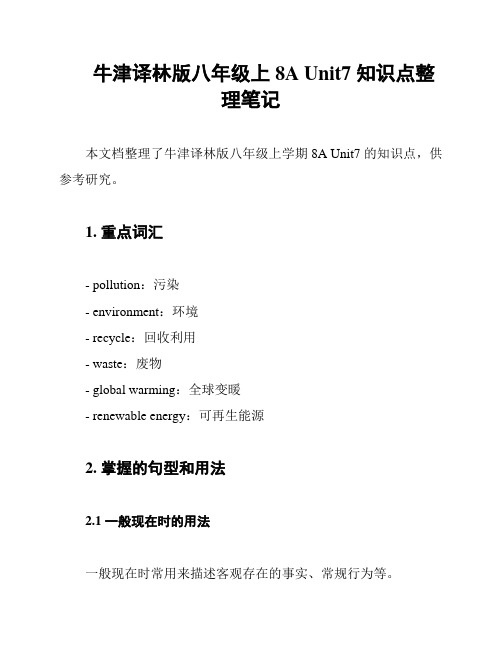
牛津译林版八年级上 8A Unit7 知识点整理笔记本文档整理了牛津译林版八年级上学期 8A Unit7 的知识点,供参考研究。
1. 重点词汇- pollution:污染- environment:环境- recycle:回收利用- waste:废物- global warming:全球变暖- renewable energy:可再生能源2. 掌握的句型和用法2.1 一般现在时的用法一般现在时常用来描述客观存在的事实、常规行为等。
例句:- Water boils at 100 degrees Celsius.(水在100摄氏度时沸腾。
)- The sun rises in the east.(太阳从东方升起。
)2.2 祈使句的用法祈使句用来表达请求、命令、建议等。
例句:- Close the door, please.(请关门。
)- Don't litter.(不要乱丢垃圾。
)- Let's recycle more.(让我们回收更多。
)3. 阅读技巧在阅读课文时,可以使用以下技巧:- 预测:在阅读前,浏览文章标题、开头和结尾,预测文章内容。
- 理解关键词:关注关键词的意思,有助于理解整个文章的大意。
- 划线标记:遇到重点信息或不懂的地方,可以用铅笔在纸上划线或做笔记。
4. 写作指导在写作过程中,可以使用以下句型或短语:- In my opinion, ...(在我看来,...)- It is important to...(...是重要的)- We should...(我们应该...)- For example, ...(例如,...)- As a result, ...(结果,...)希望以上整理对你的研究有所帮助。
祝你研究进步!。
牛津译林版八年级上8AUnit7知识点梳理学案
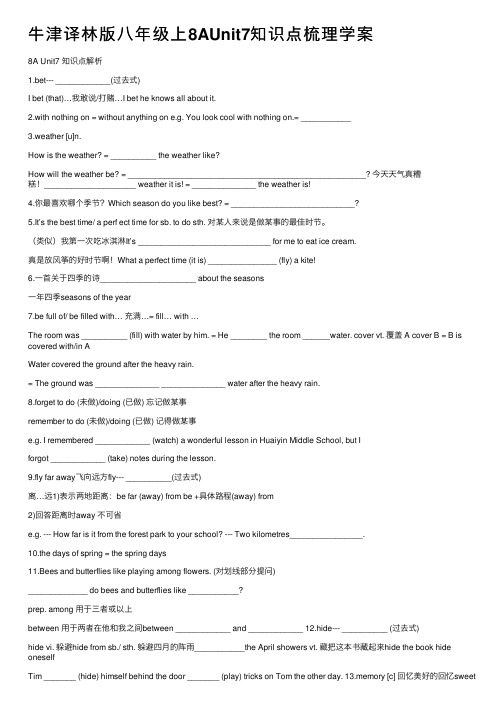
⽜津译林版⼋年级上8AUnit7知识点梳理学案8A Unit7 知识点解析1.bet--- ____________(过去式)I bet (that)…我敢说/打赌…I bet he knows all about it.2.with nothing on = without anything on e.g. You look cool with nothing on.= ___________3.weather [u]n.How is the weather? = __________ the weather like?How will the weather be? = ____________________________________________________? 今天天⽓真糟糕!____________________ weather it is! = ______________ the weather is!4.你最喜欢哪个季节?Which season do you like best? = ___________________________?5.It’s the best time/ a perf ect time for sb. to do sth. 对某⼈来说是做某事的最佳时节。
(类似)我第⼀次吃冰淇淋It’s _____________________________ for me to eat ice cream.真是放风筝的好时节啊!What a perfect time (it is) _______________ (fly) a kite!6.⼀⾸关于四季的诗_____________________ about the seasons⼀年四季seasons of the year7.be full of/ be filled with… 充满…= fill… with …The room was __________ (fill) with water by him. = He ________ the room ______water. cover vt. 覆盖 A cover B = B is covered with/in AWater covered the ground after the heavy rain.= The ground was ______________ ______________ water after the heavy rain.8.forget to do (未做)/doing (已做) 忘记做某事remember to do (未做)/doing (已做) 记得做某事e.g. I remembered ____________ (watch) a wonderful lesson in Huaiyin Middle School, but Iforgot ____________ (take) notes during the lesson.9.fly far away飞向远⽅fly--- __________(过去式)离…远1)表⽰两地距离:be far (away) from be +具体路程(away) from2)回答距离时away 不可省e.g. --- How far is it from the forest park to your school? --- Two kilometres________________.10.the days of spring = the spring days11.Bees and butterflies like playing among flowers. (对划线部分提问)_____________ do bees and butterflies like ___________?prep. among ⽤于三者或以上between ⽤于两者在他和我之间between ____________ and ____________ 12.hide--- __________ (过去式)hide vi. 躲避hide from sb./ sth. 躲避四⽉的阵⾬___________the April showers vt. 藏把这本书藏起来hide the book hide oneselfTim _______ (hide) himself behind the door _______ (play) tricks on Tom the other day. 13.memory [c] 回忆美好的回忆sweetmemories[u] 记忆⼒have a good/poor memory for sth.14. shade [u]n 在树荫下under the shade of the tree15. turn 1) 系动词树叶变黄Leaves turn brown 变得苍⽩turn pale2) ⾏为动词turn on/ off 打开;旋转turn over 翻⾝/转turn around 转⾝turn into 由⼀种状况转为另⼀种e.g. Caterpillars (⽑⽑⾍) turn into butterflies.3) n. (多⼈依次) 轮到的机会It’s one’s turn to do sth.轮到我擦⿊板。
译林英语八上Unit 7 知识要点梳理及精选练习--江苏无锡天一中学年牛津译林版英语八年级上册

英语8A Unit 7 知识要点梳理及精选练习一.重点单词、短语、句子Comic---Task1.Then hide from the April showers. 有时候要躲避四月阵雨的突袭。
(P82)①“hide from”意为“躲避,使…看不见”, hide的过去式_________ 捉迷藏______________Eg: Jimmy , how can you hide from us in such a small corner? Are you OK?②“shower”这里意为“阵雨”,另一个重要含义“沐浴,淋浴”,洗澡______________________Eg: 看到太阳雨真惊奇! _________________________________________________!解析:hid(---hidden), hide and seek, take/have a showerHow amazing it is to see the shower!2. “by , near, beside”: Can I have a look at the bookcase _______ the window?(靠窗)Could you tell me how I can get to a hospital ________here?When an earthquake happens , make sure not to stand_______tall buildings.He sat______the table and began to have dinner as if nothing happened just now.解析:by, near, beside, at/beside3.Fall into piles upon the ground. (片片)掉落在地上。
- 1、下载文档前请自行甄别文档内容的完整性,平台不提供额外的编辑、内容补充、找答案等附加服务。
- 2、"仅部分预览"的文档,不可在线预览部分如存在完整性等问题,可反馈申请退款(可完整预览的文档不适用该条件!)。
- 3、如文档侵犯您的权益,请联系客服反馈,我们会尽快为您处理(人工客服工作时间:9:00-18:30)。
8A Unit7 知识点解析1.bet--- ____________(过去式)I bet (that)…我敢说/打赌…I bet he knows all about it.2.with nothing on = without anything on e.g. You look cool with nothing on.= ___________3.weather [u]n.How is the weather? = __________ the weather like?How will the weather be? = ____________________________________________________? 今天天气真糟糕!____________________ weather it is! = ______________ the weather is!4.你最喜欢哪个季节?Which season do you like best? = ___________________________?5.It’s the best time/ a perf ect time for sb. to do sth. 对某人来说是做某事的最佳时节。
(类似)我第一次吃冰淇淋It’s _____________________________ for me to eat ice cream.真是放风筝的好时节啊!What a perfect time (it is) _______________ (fly) a kite!6.一首关于四季的诗_____________________ about the seasons一年四季seasons of the year7.be full of/ be filled with… 充满…= fill… with …The room was __________ (fill) with water by him. = He ________ the room ______water. cover vt. 覆盖 A cover B = B is covered with/in AWater covered the ground after the heavy rain.= The ground was ______________ ______________ water after the heavy rain.8.forget to do (未做)/doing (已做) 忘记做某事remember to do (未做)/doing (已做) 记得做某事e.g. I remembered ____________ (watch) a wonderful lesson in Huaiyin Middle School, but Iforgot ____________ (take) notes during the lesson.9.fly far away飞向远方fly--- __________(过去式)离…远1)表示两地距离:be far (away) from be +具体路程(away) from2)回答距离时away 不可省e.g. --- How far is it from the forest park to your school? --- Two kilometres________________.10.the days of spring = the spring days11.Bees and butterflies like playing among flowers. (对划线部分提问)_____________ do bees and butterflies like ___________?prep. among 用于三者或以上between 用于两者在他和我之间between ____________ and ____________ 12.hide--- __________ (过去式)hide vi. 躲避hide from sb./ sth. 躲避四月的阵雨___________the April showers vt. 藏把这本书藏起来hide the book hide oneselfTim _______ (hide) himself behind the door _______ (play) tricks on Tom the other day. 13.memory [c] 回忆美好的回忆sweet memories[u] 记忆力have a good/poor memory for sth.14. shade [u]n 在树荫下under the shade of the tree15. turn 1) 系动词树叶变黄Leaves turn brown 变得苍白turn pale2) 行为动词turn on/ off 打开;旋转turn over 翻身/转turn around 转身turn into 由一种状况转为另一种e.g. Caterpillars (毛毛虫) turn into butterflies.3) n. (多人依次) 轮到的机会It’s one’s turn to do sth.轮到我擦黑板。
It’s my turn to clean the blackboard.16. fall--- _________(过去式) 掉落fall over 跌倒很容易在冰上摔倒。
It’s easy to fall over on the ice.fall down 坠落fall down from sth. = fall off sth. 从… 上坠落The snow/rain ___________________(降落) heavily last night.fall into piles upon the ground 落地成堆pile [c]n a pile of …. 一堆… 成堆的树叶____________ leaves17. harvest v. 收割;收获收割庄稼________________ n. 收成have a good harvest18. as 1) conj. 当…….时; 正如as the saying goes/ as we all know随着as time goes by; as the temperature rises/ drops2) prep. 作为as a student/ teacherbe the same as … e.g. 我和你一样I am the same as you. 反义短语be __________________ be the same +n.单+ as e.g. He is the same weight/age/height as me. (描述某一方面一样)= He is as _____________/ ______________/___________ as me.实义动词the same +n.单+as e.g. He bought the same book as I did.19. rise/drop rise--- ____________ (过去式)drop--- ___________ (过去式)1)vi. 上升/下降到rise/drop to The sun/ flag/ voice/ blood pressure rises.drop out of /drop a little/ drop below zero2) n. a rise/drop in temperature20. …rhyme with … …和…押韵21. be busy doing sth. 忙于做某事be busy with sth. 忙于某事be too busy to do sth. 太忙了而未能做某事He is too busy ______(cook) breakfast for his son. be too busy doing sth. to do sth. 太忙于做某事而未能做某事He is too busy _________________ (finish) the paper _________________ (have) a good rest.22. 句子的基本组成部分为:主语(S)、动词(V)、宾语(O)动词可分为:行为动词【及物动词(vt.)、不及物动词(vi.)】和系动词。
其可展现句子的时态,是句子的核心。
五种句型:1) S+V e.g. The sun is shining.2) S+V+O e.g. They like staying at home. 此结构宾语只有一个3) S+V+P e.g. The idea sounds good.表语(P):是用来说明主语的系动词:1.be动词 2. 感官动词:feel, sound, smell, taste, look, seem3. 表变化become, get, turn, grow 表稳定状态keep, stay4) S+V+IO+DO e.g. He built the bird a wood house= He built a wood house _______ the bird.He sent me a postcard. = He sent a postcard __________ me.该结构动词后又两个宾语:直接宾语(DO)和间接宾语(IO) 可用介词____和____转换此结构通常情况下:间接宾语为人,直接宾语为物5) S+V+DO+OC e.g. He found his wallet lost.宾补(OC):用来补充说明宾语的行为或状态直宾和宾补在逻辑上构成主谓关系He found his wallet lost. = He found his wallet _________ _________.宾补:1. 名词或名词短语作宾补call sb. sth.2. 形容词或形容词短语作宾补make/keep/think/find sb./sth. adj.3. to do作宾补(带to) advise/want/wish/invite/ask/tell sb. to do sth.4. to do作宾补(不带to)+ doing作宾补: see/hear/notice sb. do/doing make/let sb. do ☆可在五种句型中添加时间状语、地点状语、方式状语She found herself a good runner 句型结构__________________________________________ Ann made her sister a paper rose as the birthday present. 句型结构_______________________ He is singing excitedly. 句型结构__________________________________________________ 23. wake up 醒来把我叫醒wake _______ up从早到晚from morning till night 踢球kick the ball24. be mainly +adj. 天气以干燥和晴朗为主be _________ (main) dry and sunny25. rest n.其余的部分(人或物)the rest of +n. 剩余的… (其作主语时,谓语动词由所接名词决定)e.g. The rest of the classmates ______________ (be) doing exercises carefully.The rest of the juice ________________ (go) bad.26. around adv. 大约be around 9。
